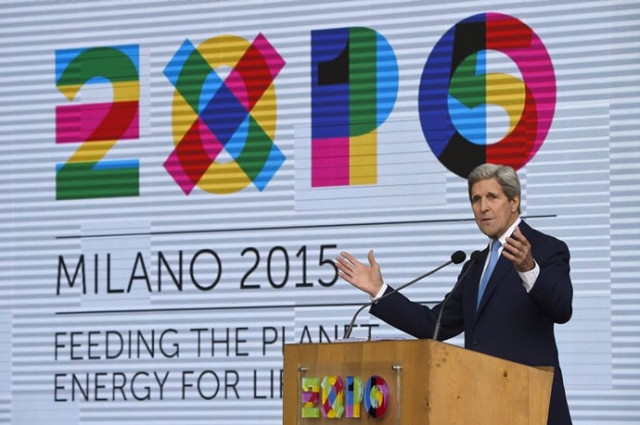Climate change fans global security crisis, Kerry
US Secretary of State cited that mass migration would significantly worsen if global warming persists

US Secretary of State John Kerry speaks during a visit at the Universal Exhibition 2015 in Milan on October 17, 2015. PHOTO: AFP
"Climate change is perhaps the most significant threat to global food security today. Make no mistake: the implications here extend well beyond hunger," he said just weeks before a key world climate conference in Paris.
"This isn't only about food security; it's about global security, period," he said during a speech at Milan's 2015 Expo.
Kerry said it was "not a coincidence that, immediately prior to the civil war in Syria, the country experienced the worst drought on record", sparking the migration of some 1.5 million people "that intensified the political unrest that was beginning to brew".
Read: Is climate change a bigger threat than terrorism?
"I'm not suggesting the crisis in Syria was caused by climate change, obviously, it wasn't. It was caused by a brutal dictator who barrel bombed, starved, tortured, and gassed his own people.
"But the devastating drought clearly made a bad situation a whole lot worse," he said.
He described climate change as "threat multiplier".
"Even if it doesn't ignite conflict, it has the ability to fan the flames and to make situations much more complicated for political leaders to deal with."
Kerry cited the mass migration to Europe as an example of a crisis provoked partly by climate change -- which he warned will get significantly worse if large parts of the world become uninhabitable due to global warming.
Read: Issues of climate change discussed
"Here in Europe, you're in the middle of one of the worst refugee crises in decades.
"Unless the world meets the urgency of this moment, the horrific refugee situation we're facing today will pale in comparison to the mass migrations that intense droughts, sea-level rise, and other impacts of climate change are likely to bring about," he said.
The US stands ready to continue advancing creative solutions to #foodsecurity, malnutrition, #climatechange @JohnKerry #WFD2015 #Expo2015
— US Consulate Milan (@USConsMilan) October 17, 2015
Kerry's call comes ahead of the UN's COP21 conference in November which aims to secure a pact on greenhouse gases that would limit global warming to two degrees Celsius (3.6 degrees Fahrenheit) over pre-industrial times.
Read: Austria warns migration crisis could lead to use of force on borders
The White House has made tackling climate change a priority, despite stern opposition from the Republican-controlled Congress.
The last big push for a world climate deal was in Copenhagen in 2009. It nearly ended in a fiasco after rich and poor countries bickered over how to share the burden for addressing the problem.



















COMMENTS
Comments are moderated and generally will be posted if they are on-topic and not abusive.
For more information, please see our Comments FAQ